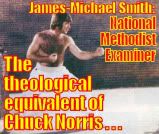Hello Dojo,
I will be leaving for Kenya this weekend and wanted to get one solid post in before I leave. I felt like this would be a great one, especially in light of the last post being a request for prayer for my friend Lynda.
Last week I received the following email at the office. I asked the sender if I could use it as a post in the Dojo and just abbreviate her name. She said that would be fine. Here's the original email she sent me:
To: James-Michael Smith
Subject: Prayer
James-Michael,
I have hesitated long enough on my question to you. I know that with your knowledge you are a good one to ask, but I’ve been a little embarrassed and just hated to ask. I need to know Who am I praying to? Do you specifically pray to GOD or Jesus? Is this a dumb question? Should I know this? I’m sorry if it’s petty, but my prayer life is so weak and I’m trying to be stronger and some how seem to struggle when I get hung up on whom I’m praying to. I sometimes pray to Jesus say for the things he did while here and the path he made, etc. Then pray to GOD for the world he created, etc. I have so many other prayers and wonder to whom am I praying to both?
Sincerely,
T
That being said, here is my response to T's email. As always, any comments, critiques, or questions are welcome in the Dojo!
From: James-Michael Smith [mailto:gsdisciple@gsumc.
Sent: Wednesday, July 16, 2008 12:19 PM
To: T
Subject: RE: Prayer
T,
Don't be silly! This isn't AT ALL an embarrassing question! It strikes at the very heart of the Christian faith! You're thinking about prayer theologically-
Here's what we know:
* God is the only one people in the OT ever prayed to.
* God is the only one Jesus Himself ever prayed to.
* Jesus is our model of what a true relationship with God is.
Therefore...
*** God is the only one we pray to.
Sounds good, right?
Except...
* Jesus claimed to somehow BE God.
* Jesus' earliest followers sometimes prayed to Jesus.
* Jesus' earliest followers sometimes prayed to the Holy Spirit.
Therefore...
*** We sometimes pray to Jesus and/or the Holy Spirit
Now, how does this not contradict the first conclusion??
Drumroll....
* Jesus and the Holy Spirit are somehow God!
Ta-dah! The Trinity!
It was by reasoning through various thoughts and issues like this that the Church Fathers gradually were able to put into words the concept of God's Triune nature, or what we call "The Trinity." Despite being immersed in a Greco-Roman philosophical world of logic and propositions, the early Church was able to hold to the mystery of God's nature as revealed in the Hebrew Bible and the person and work of Jesus and the Holy Spirit. They were able to verbalize the Biblical concept of God's triune nature with the following:
God is 1 substance (Greek: "ousia") in 3 persons (Greek: "hypostases"). Not 1 substance and 3 substances, or 1 person and 3 persons. [btw, the words "substance" and "person" don't really capture the idea very well in modern English because of how we normally use them. That's why I'm using the Greek terms below.]
Therefore, no matter which "hypostases" you are praying to (God the Father, God the Son, God the Spirit), you are always praying to the same "ousia", God.
This is why the NT writers could switch between praying to God, Jesus or the Holy Spirit with such ease--it's all God.
I personally usually pray to God the Father, and occasionally address my prayers to Jesus or the Holy Spirit whenever I want to approach God in one of those aspects.
This is such a great question for you to be struggling with because it shows a mature and reflective faith and it goes beyond what most people simply don't ever bother to think about! Be encouraged by this.
And if you would like to borrow it, I have the book "Prayer" by Richard Foster in our Discipleship library in my office. It is one of the best books ever written on the subject of prayer and I recommend it wholeheartedly.
Hope this helps. Let me know if you have any follow up questions or thoughts.
Walking together...
James-Michael Smith
Pastor of Discipleship
Good Shepherd UMC
Charlotte, NC






